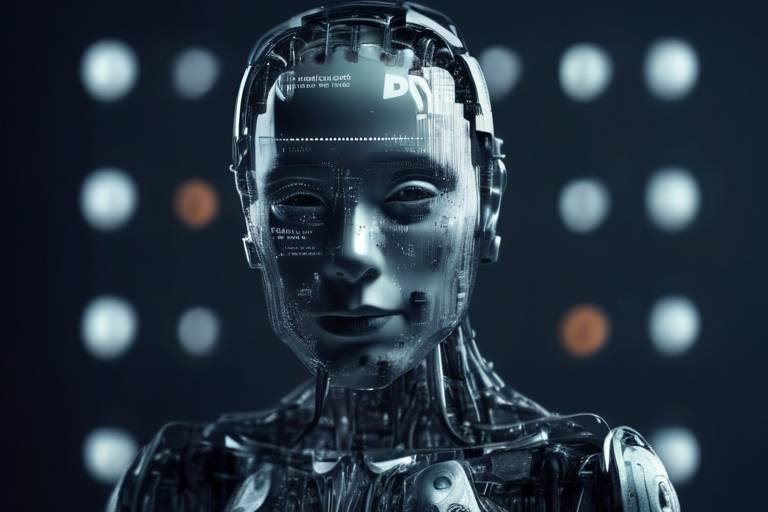AI and Ethics: Walking the Tightrope
In today's rapidly evolving technological landscape, the intersection of artificial intelligence (AI) and ethics has become a focal point of discussion. As we integrate AI into various aspects of our lives—from healthcare to finance—it's crucial to consider the ethical implications that accompany these advancements. The journey of developing AI is akin to walking a tightrope; on one side lies incredible potential and innovation, while on the other side lurks the risk of unintended consequences and ethical dilemmas. This article will delve into the complexities of this relationship, exploring the challenges and frameworks necessary for responsible AI development.
Why should we care about ethical considerations in AI? The answer is simple: the stakes are high. Neglecting ethical principles in AI can lead to serious consequences, including the perpetuation of bias, violation of privacy, and erosion of trust in technology. Imagine a world where AI systems make decisions that affect our lives without any ethical oversight—it’s a recipe for disaster. On the flip side, adopting ethical guidelines can lead to significant benefits, such as enhanced trust among users, improved societal outcomes, and the promotion of fairness. By prioritizing ethical AI, we pave the way for a future where technology serves humanity rather than undermining it.
The road to ethical AI is fraught with challenges that we must address head-on. Some of the primary ethical dilemmas include:
- Bias: AI systems can inadvertently perpetuate discrimination if they are trained on biased data.
- Privacy: The collection and use of personal data raise significant privacy concerns.
- Accountability: Determining who is responsible for the actions of AI systems can be murky.
- Impact on Employment: Automation can lead to job displacement, raising ethical questions about the future of work.
Each of these challenges requires careful consideration and proactive measures to ensure that AI development aligns with ethical standards.
One of the most pressing issues in AI today is bias. When AI algorithms are trained on data that reflects historical inequalities, they can perpetuate and even amplify these biases. For example, if an AI system used for hiring is trained on a dataset that favors one demographic over others, it may unfairly disadvantage qualified candidates from underrepresented groups. To combat this, we must promote fairness in AI systems through diverse data and inclusive design practices.
To identify and mitigate algorithmic bias, several strategies can be employed:
- Transparency: Developers should strive for transparency in their algorithms to allow for scrutiny and understanding of decision-making processes.
- Diverse Datasets: Utilizing diverse datasets can help ensure that AI systems are trained on a wide range of perspectives, reducing the risk of bias.
- Continuous Monitoring: Ongoing evaluation of AI systems is essential to identify and correct any biases that may arise over time.
Engaging diverse stakeholders in the design process is critical for creating AI systems that serve all demographics fairly and effectively. Inclusive design practices not only help in identifying potential biases early on but also foster a sense of ownership and trust among users. By considering the needs and perspectives of various communities, we can develop AI solutions that are not only innovative but also equitable.
As AI applications increasingly rely on data collection, the ethical implications of this practice cannot be ignored. Users are becoming more aware of their privacy rights, and there is a growing demand for robust data protection measures. Striking a balance between innovation and user privacy is paramount. Companies must implement stringent data protection policies while ensuring that their AI systems do not compromise individual privacy.
Establishing accountability frameworks for AI developers and organizations is essential to uphold ethical responsibilities. Without clear accountability, unethical practices can flourish. Organizations must take ownership of their AI systems and be prepared to face consequences for any unethical outcomes.
Current legal frameworks governing AI often lag behind technological advancements. There is an urgent need for updated regulations that address emerging ethical challenges. Policymakers must collaborate with technologists, ethicists, and the public to create comprehensive guidelines that ensure ethical AI development.
Corporations play a pivotal role in fostering ethical AI practices. Implementing internal policies, providing ethical training, and engaging stakeholders are vital steps in promoting responsible innovation. Companies that prioritize ethics not only enhance their reputation but also contribute positively to society.
As we look to the future, the landscape of AI ethics will continue to evolve. Advancements in technology, shifting societal expectations, and ongoing dialogue among stakeholders will shape the ethical standards we adhere to. It’s a collective responsibility to ensure that AI serves humanity in a way that is ethical, fair, and just.
1. Why is ethical AI important?
Ethical AI is crucial because it helps prevent discrimination, protects user privacy, and builds trust in technology.
2. What are the main challenges in AI ethics?
The main challenges include bias, privacy concerns, accountability, and the impact of automation on employment.
3. How can bias in AI be addressed?
Bias can be addressed through transparency, diverse datasets, and continuous monitoring of AI systems.
4. What role do corporations play in ethical AI?
Corporations are responsible for implementing internal policies, ethical training, and engaging stakeholders to promote responsible innovation.

The Importance of Ethical AI
In today's fast-paced digital landscape, the integration of artificial intelligence (AI) into various sectors is not just a trend; it’s a revolution. However, with great power comes great responsibility. The importance of ethical AI cannot be overstated, as it plays a crucial role in shaping the future of technology and its impact on society. We must ask ourselves: what happens when we neglect the ethical considerations surrounding AI? The consequences can be dire, leading to discrimination, privacy invasions, and a lack of accountability that can undermine trust in technology.
Imagine a world where AI systems make decisions that affect our lives without any ethical guidelines—sounds unsettling, right? This is why adopting ethical frameworks in technology development is essential. By prioritizing ethical AI, we can:
- Enhance Trust: When AI systems operate transparently and ethically, they foster trust among users, which is vital for widespread adoption.
- Promote Fairness: Ethical AI helps ensure that algorithms treat all individuals fairly, reducing the risk of bias and discrimination.
- Protect Privacy: With robust ethical guidelines, we can safeguard user data and maintain privacy, balancing innovation with respect for individual rights.
- Encourage Accountability: Establishing ethical standards holds developers and organizations accountable for their AI systems, ensuring that they act responsibly.
Moreover, ethical AI is not just about avoiding negative outcomes; it’s also about harnessing the positive potential of AI technologies. When we embed ethics into AI development, we unlock opportunities for innovation that align with societal values. This alignment can lead to advancements in healthcare, education, and many other fields, ultimately benefiting humanity.
To illustrate the significance of ethical AI, consider the following table that outlines the potential consequences of neglecting ethical standards versus the benefits of implementing them:
| Neglecting Ethical Standards | Implementing Ethical Standards |
|---|---|
| Increased bias and discrimination | Promotion of fairness and equality |
| Loss of user trust | Enhanced user confidence |
| Privacy violations | Stronger data protection |
| Lack of accountability | Clear accountability frameworks |
In conclusion, the importance of ethical AI is not merely a theoretical discussion; it is a pressing necessity in our technology-driven world. By embracing ethical considerations, we can pave the way for a future where AI serves as a force for good, enhancing our lives while safeguarding our values. The journey toward ethical AI requires collaboration among developers, policymakers, and society as a whole. Only through this collective effort can we ensure that AI technologies are developed responsibly, benefiting everyone.
Q: Why is ethical AI important?
A: Ethical AI is crucial to prevent bias, discrimination, and privacy violations, fostering trust and accountability in technology.
Q: How can we ensure AI systems are fair?
A: By using diverse datasets, implementing inclusive design practices, and continuously monitoring AI systems for biases.
Q: What role do corporations play in ethical AI?
A: Corporations are responsible for establishing internal policies, providing ethical training, and engaging stakeholders to promote responsible innovation.

Key Ethical Challenges in AI
As we delve into the realm of artificial intelligence, it becomes increasingly clear that the technology, while groundbreaking, is not without its ethical quandaries. The integration of AI into various aspects of our lives raises significant questions that demand our attention. These challenges are not just technical hurdles; they are deeply rooted in societal values and human rights. Understanding these ethical dilemmas is crucial for the responsible development of AI systems that align with our moral compass.
One of the most pressing issues is bias. AI systems learn from data, and if that data reflects historical biases or societal inequalities, the AI can inadvertently perpetuate these issues. For instance, if an AI model is trained on data that predominantly features one demographic, it may not perform well for underrepresented groups, leading to unfair outcomes. This brings us to the importance of fairness in AI. To create equitable systems, developers must ensure that their algorithms are trained on diverse datasets and that they actively work to mitigate bias.
Another critical ethical challenge is privacy. The data that fuels AI systems often includes sensitive personal information. As these technologies evolve, the line between innovation and user privacy becomes increasingly blurred. How do we protect individuals' rights while still harnessing the power of AI? Robust data protection measures are essential, and organizations must strike a balance between utilizing data for advancement and safeguarding user information.
Moreover, the question of accountability in AI development cannot be overlooked. As AI systems make decisions that impact lives, it is imperative to establish clear accountability frameworks. Who is responsible when an AI system makes a mistake? Is it the developer, the organization, or the AI itself? This ambiguity can lead to a lack of trust in AI technologies, which is detrimental to their adoption and effectiveness. Therefore, a structured approach to accountability must be developed, ensuring that ethical responsibilities are upheld and that there are consequences for unethical practices.
We also cannot ignore the societal implications of automation. The rise of AI threatens to disrupt traditional job markets, leading to fears of mass unemployment. As machines take over tasks once performed by humans, we must consider the ethical implications of such shifts. How do we support workers who may be displaced by automation? This challenge requires a collective effort to rethink workforce development and ensure that the benefits of AI are shared across society.
In summary, the key ethical challenges in AI—bias, privacy, accountability, and the impact of automation—are interconnected and complex. Addressing them requires a multifaceted approach that involves collaboration among technologists, ethicists, policymakers, and the public. Only through open dialogue and a commitment to ethical principles can we navigate the tightrope of AI development and ensure that technology serves humanity in a fair and just manner.
- What is the main ethical challenge in AI? - The main challenges include bias, privacy concerns, accountability, and the impact of automation on employment.
- How can we address bias in AI? - By using diverse datasets, implementing inclusive design practices, and continuously monitoring AI systems for fairness.
- Why is privacy important in AI? - Protecting user data is crucial to maintaining trust and safeguarding individual rights in an increasingly data-driven world.
- Who is responsible for AI decisions? - Accountability in AI is complex; it involves developers, organizations, and possibly regulatory bodies.

Bias and Fairness
In today’s rapidly evolving technological landscape, the issue of bias in artificial intelligence has emerged as a critical concern. Imagine a world where the very systems designed to assist us inadvertently perpetuate inequality and discrimination. This isn't just a hypothetical scenario; it's a reality that many face due to biased algorithms. AI systems, which are often perceived as objective and neutral, can actually reflect the prejudices present in the data they are trained on. This raises an essential question: how can we ensure that our AI systems are fair and just for everyone?
Bias in AI can manifest in various forms, influencing decisions in crucial areas such as hiring, lending, law enforcement, and healthcare. For instance, if an AI system is trained on historical data that reflects societal biases, it may inadvertently favor one demographic over another. This is particularly alarming when considering the potential consequences on employment opportunities or access to services. To combat this, it is vital to adopt strategies that promote fairness in AI systems. Here are a few key approaches:
- Diverse Data Sets: Utilizing a wide range of data sources that encompass various demographics can help mitigate bias. It’s essential to ensure that the training data represents the diversity of the population it serves.
- Inclusive Design Practices: Engaging a diverse group of stakeholders in the design process can provide valuable perspectives and help identify potential biases early on.
- Continuous Monitoring: Implementing ongoing assessments of AI systems can help detect and rectify biases that may arise after deployment.
Addressing these issues is not just a technical challenge; it’s a moral imperative. The consequences of ignoring bias in AI can be profound, leading to systems that not only fail to serve all users equitably but also exacerbate existing inequalities. By prioritizing fairness in AI development, we can create systems that are not only efficient but also ethical and inclusive.
Moreover, the conversation around bias and fairness in AI is not just about correcting past mistakes; it’s about envisioning a future where technology uplifts rather than undermines our shared values. As we move forward, the importance of transparency in AI algorithms cannot be overstated. Developers must be willing to disclose how their systems operate and the data that informs their decisions. This level of openness fosters trust and accountability, which are essential for ethical AI development.
In conclusion, the path to achieving fairness in AI is a multifaceted journey that requires collaboration among technologists, ethicists, and the communities affected by these technologies. By embracing diverse perspectives and committing to continuous improvement, we can steer AI towards a future that is not only innovative but also just.
- What is algorithmic bias? Algorithmic bias refers to systematic and unfair discrimination that occurs in AI systems due to biased data or flawed algorithms.
- How can we identify bias in AI? Bias can be identified through audits, testing with diverse datasets, and analyzing the outcomes of AI decisions across different demographic groups.
- What role do stakeholders play in promoting fairness? Stakeholders, including users and affected communities, provide insights that can help shape more equitable AI systems through inclusive design practices.

Addressing Algorithmic Bias
Algorithmic bias is a pressing concern in the realm of artificial intelligence, as it can lead to unfair and discriminatory outcomes that affect individuals and communities. To effectively address this issue, it is essential to adopt a multi-faceted approach that includes transparency, diverse datasets, and continuous monitoring of AI systems. By shining a light on how algorithms are developed and the data they use, we can begin to unravel the complexities of bias.
One of the first steps in combating algorithmic bias is to ensure transparency in AI models. Developers should strive to make their algorithms understandable and accessible, allowing stakeholders to scrutinize the decision-making processes involved. This could involve providing clear documentation on how algorithms function, the data sources they utilize, and the criteria used for decision-making. Transparency not only builds trust among users but also encourages accountability in the development process.
Next, the importance of diverse datasets cannot be overstated. Many AI systems are trained on data that lacks representation from various demographics, leading to skewed results that perpetuate existing inequalities. To mitigate this, developers should actively seek out and include diverse data sources that reflect the broad spectrum of human experiences. This can involve collaboration with community organizations, researchers, and other stakeholders to gather insights and data that may otherwise be overlooked.
Moreover, continuous monitoring of AI systems is crucial to ensure they function as intended over time. As societal norms and values evolve, so too should the algorithms that govern our lives. Regular audits and evaluations can help identify any emerging biases and allow for timely adjustments. This proactive approach not only enhances the fairness of AI systems but also reassures users that their interests are being safeguarded.
In summary, addressing algorithmic bias requires a concerted effort from developers, organizations, and society at large. By promoting transparency, utilizing diverse datasets, and committing to ongoing monitoring, we can create AI systems that are fairer and more equitable. The path to ethical AI is not a straight line, but with dedication and collaboration, we can walk it together.
- What is algorithmic bias? Algorithmic bias refers to systematic and unfair discrimination that can occur in AI systems due to biased data or flawed algorithms.
- How can transparency help reduce algorithmic bias? Transparency allows stakeholders to understand how algorithms work and how decisions are made, which can lead to accountability and trust.
- Why is it important to use diverse datasets? Diverse datasets ensure that AI systems are trained on a broad range of experiences, which helps to prevent skewed results and promotes fairness.
- What role does continuous monitoring play in addressing bias? Continuous monitoring helps to identify and rectify biases that may emerge as societal norms change, ensuring that AI systems remain equitable over time.

Inclusive Design Practices
When we talk about in the realm of artificial intelligence, we're diving into a crucial aspect that can make or break the effectiveness of AI systems. Imagine a world where technology is created with everyone in mind—regardless of their background, identity, or abilities. This isn't just a nice thought; it's a necessity. Inclusive design ensures that AI applications are not only functional but also accessible and fair to all users. It’s like building a bridge that everyone can cross, rather than a narrow path that leaves some behind.
To achieve this, we must engage a diverse range of stakeholders throughout the entire design process. This means not just inviting a select few to the table but actively seeking input from various demographics, including marginalized communities. By doing so, we can gather insights that reflect a broader spectrum of needs and experiences. For instance, consider how a voice recognition system might perform poorly for individuals with accents or speech impairments if those user groups are not represented during development. This highlights the importance of diversity in data collection and testing.
Moreover, inclusive design practices go beyond just gathering diverse input; they also involve a commitment to continual improvement. AI systems should be regularly assessed and updated based on user feedback and changing societal norms. This is where the concept of iterative design comes into play. By treating design as an ongoing process rather than a one-time event, developers can ensure that their systems evolve alongside user needs. For example, a social media platform might start with basic accessibility features but can expand them as they receive feedback from users with disabilities.
Incorporating inclusive design practices can also lead to business benefits. Companies that prioritize inclusivity often find themselves reaching a wider audience. This is not just about doing the right thing; it's also about tapping into a larger market. According to a recent study, businesses that embrace diversity in their design processes are more likely to outperform their competitors. It's a win-win situation: ethical responsibility aligns with economic advantage.
In summary, inclusive design practices in AI development are essential for creating systems that are equitable and effective. By engaging diverse voices, committing to iterative improvement, and recognizing the business benefits of inclusivity, we can pave the way for a future where technology serves everyone fairly. So, let’s not just build AI; let’s build it for all.
- What is inclusive design? Inclusive design is a design methodology that aims to create products and services that are accessible to all users, regardless of their background or abilities.
- Why is inclusive design important in AI? It helps ensure that AI systems are fair, equitable, and effective for a diverse range of users, preventing discrimination and enhancing user experience.
- How can companies implement inclusive design practices? Companies can implement these practices by involving diverse stakeholders in the design process, regularly collecting user feedback, and committing to continuous improvement.

Privacy and Data Protection
In today's hyper-connected world, where data flows like water, the ethical implications of data collection in artificial intelligence (AI) applications cannot be overstated. With every click, swipe, and interaction, we leave behind a digital footprint that can be harnessed by AI systems to learn and predict our behaviors. However, this powerful capability brings with it a significant responsibility. The challenge lies in striking a balance between harnessing the benefits of AI and ensuring that individual privacy is respected and protected.
One of the most pressing concerns in the realm of AI is the way personal data is collected, stored, and utilized. With the rise of sophisticated algorithms, companies often gather vast amounts of data to enhance their services. Yet, many individuals are unaware of how their data is being used or the potential risks involved. This lack of transparency can lead to a sense of distrust among users, which is detrimental not only to businesses but also to the advancement of technology as a whole.
To address these concerns, it’s crucial for organizations to implement robust data protection measures. This includes adopting a clear and comprehensive privacy policy that outlines how data is collected, used, and shared. Furthermore, organizations should prioritize the following key principles:
- Transparency: Clearly communicate data practices to users, ensuring they understand what data is being collected and why.
- Consent: Obtain explicit consent from users before collecting their data, allowing them to make informed choices.
- Data Minimization: Limit data collection to only what is necessary for the intended purpose, reducing the risk of misuse.
- Security: Implement strong security measures to protect data from unauthorized access and breaches.
Moreover, as AI technology continues to evolve, so too must the frameworks that govern it. The balance between innovation and user privacy is delicate, and continuous dialogue among stakeholders—developers, users, and regulators—is essential to navigate this challenging landscape. As we move forward, it’s imperative that we foster a culture of ethical data stewardship, where protecting user privacy is not just an afterthought but a fundamental principle guiding AI development.
In conclusion, the ethical implications of privacy and data protection in AI are vast and complex. By establishing robust frameworks and prioritizing transparency and user consent, we can build trust and ensure that the advancements in AI technology serve to enhance our lives without compromising our fundamental rights. The future of AI should not only be about technological prowess but also about creating a safe and respectful environment for all users.
- What is the importance of privacy in AI? Privacy is crucial in AI as it ensures that individuals' personal information is protected and not misused, fostering trust in technology.
- How can companies ensure data protection? Companies can ensure data protection by implementing strong security measures, obtaining user consent, and being transparent about data practices.
- What are the risks of neglecting data privacy? Neglecting data privacy can lead to data breaches, loss of customer trust, and potential legal consequences for organizations.

Accountability in AI Development
As we dive deeper into the realm of artificial intelligence, the question of accountability becomes more pressing than ever. Who is responsible when an AI system makes a mistake? Is it the developer, the organization, or the AI itself? These questions are not just academic; they have real-world implications that can affect individuals and society at large. Establishing a clear framework for accountability in AI development is crucial to ensure that ethical standards are upheld and that there are consequences for unethical practices.
One of the primary challenges in ensuring accountability is the complexity of AI systems. Unlike traditional software, which operates on straightforward logic, AI systems often learn and evolve based on data. This means that their decisions can sometimes be opaque, making it difficult to pinpoint where things went wrong. To tackle this issue, organizations must adopt comprehensive accountability frameworks that clearly define roles and responsibilities at every stage of AI development. This includes not only the engineers who build the algorithms but also the executives who oversee the projects and the stakeholders who may be affected by their outcomes.
In addition to establishing clear lines of accountability, there is a growing need for legal and regulatory frameworks that govern AI technologies. Currently, many existing laws are outdated and fail to address the unique challenges posed by AI. As a result, there is a risk that developers might operate in a regulatory gray area, leading to potential abuses. Policymakers must work hand-in-hand with technologists to create regulations that are not only robust but also flexible enough to adapt to rapid technological advancements. This collaboration can help ensure that AI systems are developed responsibly while fostering innovation.
Furthermore, corporations have a significant role to play in promoting ethical AI practices. By implementing internal policies that prioritize accountability, organizations can set a precedent for responsible innovation. This might include:
- Establishing ethics boards to oversee AI projects.
- Providing ethical training for employees involved in AI development.
- Engaging with stakeholders to gather diverse perspectives on AI applications.
These initiatives not only enhance accountability but also build trust with consumers and society. When organizations demonstrate a commitment to ethical AI, they not only mitigate risks but also position themselves as leaders in a rapidly evolving field.
As we look to the future, the importance of accountability in AI development cannot be overstated. The landscape of technology is constantly changing, and with it, the expectations from society. Continuous dialogue among stakeholders—including developers, businesses, policymakers, and the public—will be essential in shaping ethical standards and ensuring that AI serves humanity positively. After all, in a world increasingly driven by AI, accountability is not just a nice-to-have; it's a necessity.
- What is accountability in AI development? Accountability in AI development refers to the responsibility of developers, organizations, and stakeholders to ensure that AI systems are designed, implemented, and monitored ethically.
- Why is accountability important in AI? Accountability is crucial to prevent misuse of AI technologies, protect individuals' rights, and ensure that ethical standards are maintained throughout the AI lifecycle.
- How can organizations ensure accountability? Organizations can ensure accountability by establishing clear roles and responsibilities, creating internal policies, and engaging with diverse stakeholders throughout the AI development process.

Legal and Regulatory Frameworks
As artificial intelligence (AI) continues to evolve at a breakneck pace, the need for robust has never been more pressing. These frameworks serve as the backbone for ensuring that AI technologies are developed and deployed in ways that are ethical, fair, and beneficial to society. The current landscape is a patchwork of existing laws and regulations that often struggle to keep up with the rapid advancements in AI capabilities. This creates a significant challenge for lawmakers and technologists alike.
One of the primary challenges is that many existing laws were not designed with AI in mind. For instance, data protection laws such as the General Data Protection Regulation (GDPR) in Europe set strict guidelines on how personal data can be collected and processed. However, these laws may not fully address the complexities introduced by AI, particularly when it comes to issues like algorithmic transparency and accountability. As AI systems become more autonomous, the question arises: who is responsible when things go wrong? This is where the need for updated regulations becomes critical.
In many jurisdictions, there is a growing recognition that new laws are needed to address the unique challenges posed by AI. For example, some countries are exploring the implementation of AI-specific regulations that would govern everything from data usage to algorithmic accountability. These new regulations aim to strike a balance between fostering innovation and protecting individual rights. A well-structured legal framework can help mitigate risks associated with AI while encouraging responsible development and deployment.
To illustrate the current state of AI regulation, consider the following table that outlines different regions and their approaches to AI governance:
| Region | Regulatory Approach | Key Legislation |
|---|---|---|
| European Union | Comprehensive regulations focusing on data protection and algorithmic accountability | GDPR, AI Act (proposed) |
| United States | Fragmented approach with state-level initiatives and federal guidelines | Various state laws, Executive Orders |
| China | Top-down regulatory framework emphasizing state control and innovation | New Generation AI Development Plan |
Moreover, the role of international cooperation cannot be overstated. AI technologies transcend borders, making it imperative for countries to collaborate on establishing global standards and regulations. This would not only help in harmonizing laws but also in addressing ethical concerns that are universally relevant, such as bias and discrimination in AI systems. The Global Partnership on AI is one such initiative aimed at bringing together governments, industry leaders, and civil society to shape the future of AI regulation.
As we look to the future, the development of effective legal and regulatory frameworks for AI will require a multi-stakeholder approach. This means involving not just lawmakers and technologists, but also ethicists, sociologists, and the public in the conversation. After all, the ultimate goal is to ensure that AI serves humanity in a way that is ethical, equitable, and sustainable. By fostering an environment where diverse perspectives are considered, we can create a regulatory landscape that not only protects individuals but also promotes innovation.
In summary, the establishment of legal and regulatory frameworks for AI is a complex but necessary endeavor. As we navigate this uncharted territory, it is crucial to remain vigilant and proactive in addressing the ethical implications of AI technologies. Only through a collaborative effort can we hope to create a future where AI enhances our lives while upholding our fundamental values.
- What is the purpose of AI regulation? AI regulation aims to ensure that AI technologies are developed and used ethically, protecting individuals and promoting fairness.
- Why is there a need for updated laws regarding AI? Existing laws often do not address the unique challenges posed by AI, such as algorithmic bias and accountability.
- How can international cooperation help in AI regulation? International cooperation can lead to harmonized laws and shared ethical standards, addressing global concerns effectively.
- What role do stakeholders play in AI regulation? Stakeholders, including lawmakers, technologists, and the public, must collaborate to create balanced and effective regulations.

Corporate Responsibility
In today's rapidly evolving technological landscape, plays a pivotal role in shaping the future of ethical AI practices. Companies that develop and deploy AI technologies have a profound impact on society, and with that power comes a significant obligation to act responsibly. It's not just about creating innovative products; it's about ensuring that these innovations are safe, fair, and beneficial for all. So, what does corporate responsibility in AI really mean?
First and foremost, organizations must recognize their ethical obligations to their users and the broader community. This involves implementing internal policies that prioritize ethical considerations throughout the AI development lifecycle. From the initial design phase to deployment and beyond, companies should integrate ethical guidelines that reflect their commitment to responsible innovation. For instance, establishing a dedicated ethics board can help steer decision-making processes and ensure that ethical considerations are front and center.
Moreover, ethical training for employees is essential. By educating teams about the potential implications of their work, companies can foster a culture of responsibility. This training should cover various aspects of AI ethics, including bias detection, data privacy, and the societal impact of automation. When employees understand the stakes, they are more likely to make choices that align with ethical principles.
Another crucial aspect of corporate responsibility is stakeholder engagement. Companies should actively involve diverse groups, including customers, community members, and advocacy organizations, in the AI development process. This engagement can take many forms, such as focus groups, public consultations, and collaborative partnerships. By listening to a wide range of voices, organizations can better understand the potential consequences of their technologies and make informed decisions that reflect the needs and values of the community.
To illustrate the importance of corporate responsibility, consider the following table that highlights key responsibilities companies should embrace:
| Responsibility | Description |
|---|---|
| Ethical Guidelines | Develop and implement clear ethical frameworks for AI development. |
| Employee Training | Provide regular training on ethical AI practices and implications. |
| Stakeholder Engagement | Involve diverse groups in the AI development process to gather insights and feedback. |
| Transparency | Ensure transparency in AI algorithms and decision-making processes. |
| Accountability | Establish mechanisms for accountability in case of ethical breaches. |
Ultimately, the responsibility of corporations extends beyond mere compliance with laws and regulations. It is about fostering a culture of ethical innovation that prioritizes the well-being of society. Companies that embrace this mindset not only build trust with their users but also position themselves as leaders in the field of ethical AI. As we move forward, the dialogue surrounding corporate responsibility in AI must continue to evolve, ensuring that technology serves humanity in the best possible way.
- What is corporate responsibility in AI?
Corporate responsibility in AI refers to the ethical obligations that organizations have to ensure their AI technologies are developed and used in a way that is safe, fair, and beneficial for society. - Why is ethical training important for employees?
Ethical training is crucial as it helps employees understand the implications of their work, enabling them to make informed decisions that align with ethical principles. - How can companies engage stakeholders in AI development?
Companies can engage stakeholders through focus groups, public consultations, and partnerships with advocacy organizations to gather diverse perspectives and insights. - What are some key responsibilities of companies developing AI?
Key responsibilities include developing ethical guidelines, providing employee training, engaging stakeholders, ensuring transparency, and establishing accountability mechanisms.

The Future of Ethical AI
The landscape of artificial intelligence is continuously evolving, and as it does, the ethical considerations surrounding its development and deployment are becoming increasingly vital. Imagine a world where AI not only enhances our lives but does so in a manner that respects our values and upholds our rights. This vision is not just a dream; it is a necessity as we move forward. The future of ethical AI hinges on our ability to navigate complex moral landscapes while embracing technological advancements.
One of the key aspects of shaping ethical AI is the evolving societal expectations. As AI systems become more integrated into our daily lives, people are becoming more aware of their rights concerning data privacy, algorithmic fairness, and accountability. For instance, consider how consumers now demand transparency from companies regarding how their data is used. This shift in expectation is prompting organizations to rethink their strategies and prioritize ethical considerations in AI development.
Moreover, the future of ethical AI will likely see the establishment of collaborative frameworks that bring together various stakeholders, including technologists, ethicists, policymakers, and the public. By fostering open dialogues, we can create a more inclusive approach to AI development. This collaboration will help ensure that diverse perspectives are considered, ultimately leading to AI systems that are not only innovative but also equitable.
In addition, advancements in technology will pave the way for more robust ethical guidelines. As AI systems become more sophisticated, so too must our frameworks for governance. We may witness the emergence of new regulatory bodies specifically tasked with overseeing AI ethics. These organizations could help monitor compliance with ethical standards, ensuring that AI developers are held accountable for their creations.
Another exciting prospect for the future of ethical AI lies in the realm of education and training. As AI technologies evolve, so must the skill sets of those who create and manage them. Educational institutions will play a crucial role in preparing the next generation of AI professionals by incorporating ethics into their curricula. This can include training on recognizing biases, understanding data privacy laws, and fostering a culture of responsibility in technology development.
As we look ahead, it is essential to recognize that the journey towards ethical AI is ongoing. We must remain vigilant and proactive, continuously adapting our approaches as technology and societal values evolve. By prioritizing ethical considerations today, we can build a future where AI serves humanity positively and equitably.
- What is ethical AI? Ethical AI refers to the development and implementation of artificial intelligence systems that prioritize fairness, accountability, and transparency, ensuring that they respect human rights and societal values.
- Why is ethical AI important? Ethical AI is crucial because it helps prevent discrimination, protects user privacy, and fosters trust between technology and society. Neglecting ethical considerations can lead to harmful consequences.
- How can we promote ethical AI? Promoting ethical AI involves establishing clear guidelines, encouraging diverse stakeholder engagement, investing in education, and implementing robust accountability frameworks.
- What role do corporations play in ethical AI? Corporations are responsible for implementing internal policies that promote ethical practices, providing ethical training to employees, and engaging with stakeholders to ensure responsible innovation.
Frequently Asked Questions
- What is ethical AI and why is it important?
Ethical AI refers to the development and implementation of artificial intelligence systems that prioritize fairness, accountability, and transparency. It's crucial because neglecting ethical considerations can lead to harmful consequences, such as discrimination, privacy violations, and a lack of trust in technology.
- What are the main ethical challenges faced by AI today?
The primary ethical challenges include bias and fairness in algorithms, privacy and data protection concerns, accountability for AI developers, and the societal impacts of automation on employment. Each of these challenges requires careful consideration to ensure that AI benefits everyone.
- How can bias in AI algorithms be addressed?
Addressing bias involves using diverse datasets, maintaining transparency in algorithm design, and continuously monitoring AI systems. By engaging a wide range of stakeholders and prioritizing inclusive design practices, we can create AI that serves all demographics fairly.
- What role does privacy play in ethical AI?
Privacy is a significant concern in AI, as data collection can lead to misuse or unauthorized access to personal information. Ethical AI practices must balance innovation with robust data protection measures to safeguard user privacy while still allowing for technological advancement.
- Why is accountability important in AI development?
Accountability ensures that AI developers and organizations are responsible for their creations. Establishing clear ethical responsibilities and consequences for unethical practices fosters a culture of trust and integrity in AI development, which is essential for public confidence in technology.
- What existing frameworks govern AI ethics?
There are various legal and regulatory frameworks governing AI, but many are outdated and need to be revised to address emerging ethical challenges. Ongoing discussions among policymakers, technologists, and ethicists are vital for creating effective regulations that keep pace with technological advancements.
- How can corporations promote ethical AI practices?
Corporations can foster ethical AI by implementing internal policies, providing ethical training for employees, and engaging with stakeholders to understand diverse perspectives. By prioritizing responsible innovation, companies can contribute positively to the development of AI technologies.
- What does the future hold for ethical AI?
The future of ethical AI will likely involve advancements in technology alongside evolving societal expectations. Continuous dialogue among stakeholders will be essential to shape ethical standards and ensure that AI serves the public good while addressing new ethical dilemmas as they arise.



















